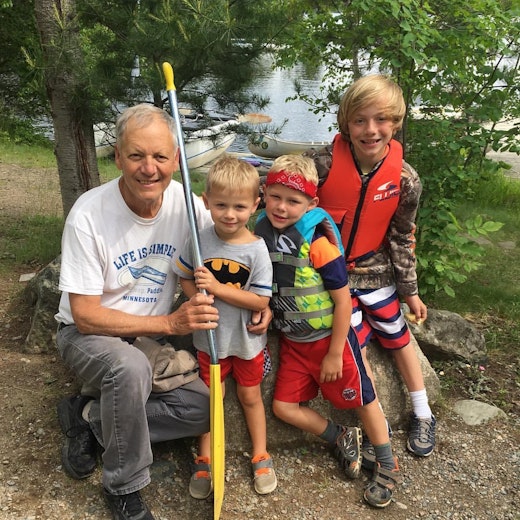
Believe it or not, a few years ago there were no cell phones. Hard wired phones (remember telephone poles) have been around for over a century. At first callers asked an operator to literally patch them through to another telephone. At a central office, she would plug two lines together. When rural houses shared a “party line,” if you picked up the phone to hear people talking, you’d hang up and try when the line was not in use. No biggie, but people preferred a private telephone line, eventually adding multiple telephone sets, some children even got personal land lines. In the 70s large, walkie-talkie telephones appeared to keep drivers connected with the office, like a plane pilot.
In the 60s and 70s Mim Erdmann handled year-round communications with hundreds of camp families on her gray, portable Royal typewriter and an occasional long-distance phone call from Greencastle. Mim and Charlie shared the Pine Point Lodge phone number in case of an emergency. When Pine Point got a call, the Seleskar family would hang a red cloth from their sign, and Charlie would stop to return the call. Deb installed a phone line in the 90s, when she insulated the camp office to live on site year-round.
Charlie and Mim could never imagine how ubiquitous cell phones would become. We literally can’t leave home without a phone… unless, you’re coming to camp.
Our parents and campers sign an agreement to leave their phone at home. This may be a challenge at first, but you’ll do fine without a continual connection to friends, family, the gaming world and internet. We are social beings and our phones tie us to familiar contacts. But leaving your phone at home eliminates…. distractions. Before you know it, you’ll tune into other campers, counselors and staff. This is your family for a few weeks each summer. Listen carefully and you will hear the sounds of nature… squirrel chatter while scurrying through tree tops, the unique song of each bird species, the twice-daily drone of the Forest Service de Havilland Beaver pontoon plane heading over the Boundary Waters, barking of scores on the pickle ball court, orders, teammates shouting on the soccer field, the welcome mess hall bell.

Listen and you may hear yourself thinking a little clearer too…, without the temptation of that cell phone in your pocket. You’ll get used to the quiet and start tending to what’s in front of you, rather than what you might see or hear on a screen.
We entertain ourselves at camp. A simple schedule keeps campers involved with one another. We prepare the cabin for daily inspection together, we interact with friends on the athletic courts and fields, we read, talk and write home during rest period. Camp is a shared experience– living, eating, playing, tripping, entertaining together.
You will paddle a canoe hard for several hours a day. From the bow watch rhythm of waves, the movement of drifting clouds, ancient rock formations skirting past covered with colorful moss and lichen. You are moving across the map, that’s progress. Push on, lean into the next stroke. Coordinate the paddle strokes with your canoe mate to steady the canoe. Your muscles ache, but that too shall pass. A sheltered campsite and hearty dinner are the goals, but enjoy the moment, the effort of getting there.
Suddenly, it just you and your canoe mate, undisturbed and free from the omnipotent internet. Zero bars received. You are alone on a lake… on this lake, looking forward to the next river or portage to measure your progress.






